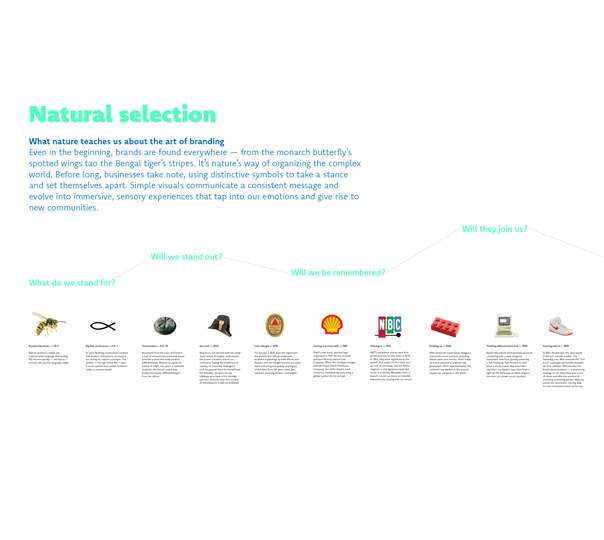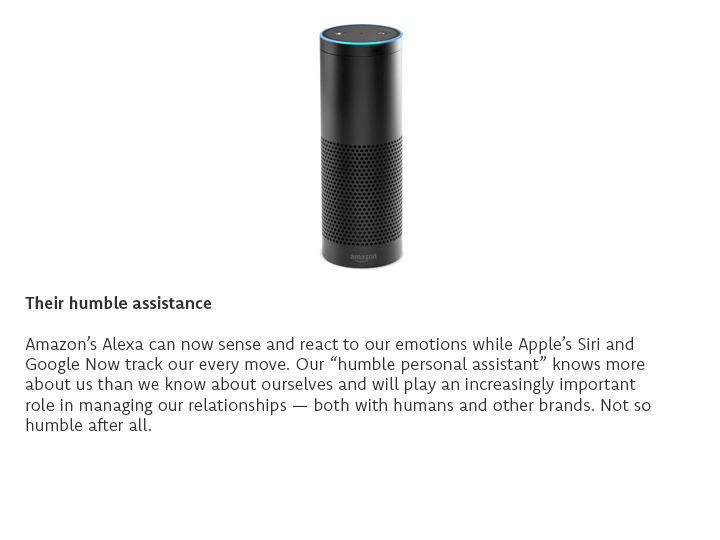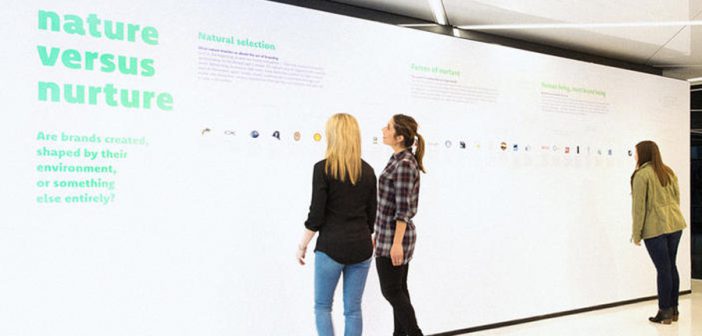An exhibit about branding traces its millennia-old history and points to its ominous future.
When was the idea of a brand born? Maybe it’s always been with us—or evenbefore us. That’s the argument on display at Like Me: Our Bond with Brands, an exhibit curated by the creative consultancy Lippincott on view at 1 World Trade Center now through October 14.
The show has some irresistibly charming pieces on view, from human-sized Starbucks cups to a blinding neon sign reading “Bitch, you’re a fan” (a reference to Madonna’s Instagram account). But perhaps the most provocative piece is a comprehensive timeline of branding, all the way from 1 BC to today, developed by senior manager Lauren Cascio and partner Matt Miksa. The time line begins with a simple argument: that the world has always been branded. You may not think of a bee’s stripes as a brand, but Lippincott argues otherwise—and convincingly, if you’re willing to play along with the conceit. After all, consider that bees’ markings are instantly distinctive to each other and across species as a biological imperative. It’s enough to make you wonder if the monarch butterfly has a feasible design patent claim against the mimicking viceroy.
Beyond the realm of biology, the curators trace the evolution of brands created by humans, moving toward logos and icons—the IBMs, NBCs, and Nikes—that are instantly recognizable by a symbol. The 20th century, the golden era of branding, is relatively predictable, since we’re still so familiar with the giants of branding today.

But around 2014, something changes. Things get murky. The idea of the brand goes from optimistic (bees were a brand, man!) to potentially dystopian (robot listening to everything you say is a brand, man!). We see the rise of devices like Amazon Echo, with voice recognition technologies backed by incredibly intelligent AI. Suddenly, Amazon’s logo wasn’t its most powerful totem anymore, nor was its one-click purchase button. It was Alexa, a pseudo-human with the voice of an automaton and the soul of a credit card scanner.
The brand is undergoing a paradigm shift. It’s no longer a mark. It’s not even a voice. It’s an intelligent entity, a personality, an algorithm capable of learning.
Truthfully, it’s a pretty screwed up future to be approaching! Whether it’s the text-based chatbots like Google Allo or Facebook Messenger, or the aforementioned conversational interfaces like Siri, Cortana, or Alexa, thesepersonality-based manifestations of brands are going to have unprecedentedly intimate access into our lives. The Nike logo on our shoes might have known that our feet smelled, but a Cortana that listens to everything will be able to predict if you have cancer.

Of course, today, chatbots are a bit of a disaster. They’re quick with a joke, butslow in a real human crisis. They’re essentially a marketer’s sometimes-cheery, sometimes-snarky Twitter voice, built into a piece of software.
Still, these bot-brands aren’t going anywhere, and several big questions remain about how they will evolve. Convergently, or divergently? Will we ever start to see distinct, convincing personalities emerge as brands—or at least a few decent archetypes? Because right now, I don’t think that most of us could really distinguish a Siri response from a Cortana response from an Alexa response, beyond the specific voice. They’re all ultimately the same inoffensive mother figure spouting off jokes clearly written by dads.
The other big questions are even more ominous: Have we evolved to be such inherently social creatures that when we have the opportunity—and eventual necessity—of talking directly to companies all day, will we all just be consumer pinballs, being knocked around a manipulation machine? Will regulators be able to keep up? Will social niceties allow big data to meld with big manipulation, so we’re sweet-talked into supersizing before we’re shamed by a drill instructor into exercising it off?
Because as we feel this intrinsic human need to answer to our chatbots simply because they chat, we’ll be prone to everything that comes along with any other relationship: pleasure, guilt, responsibility, and loyalty . . . to our new best friend, the brand.
Like Me isn’t open to the general public, but tours can be arranged upon request.
[All images courtesy Lippincott]
This article first appeared in www.fastcodesign.com


